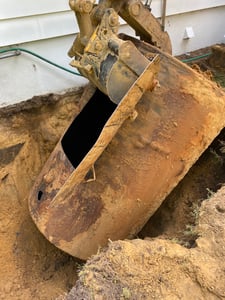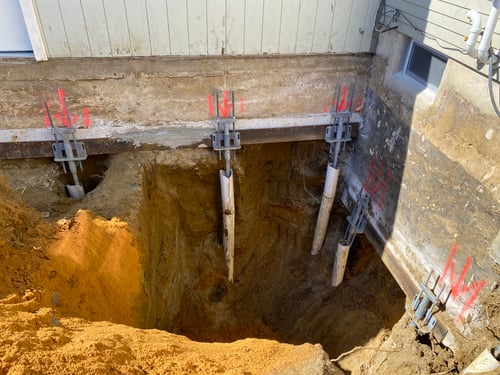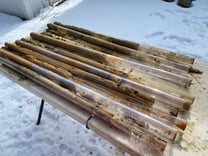Times frames when dealing with oil tanks & oil tank remediation.
Oil Tank Removal Timeframes
Apply for a permit
- Townships ask for 20 days to process a permit, but permits could take a shorter or longer time depending on their review. Curren cannot control the amount of time the permit takes.
Once the permit is received, we call in a markout (takes 3-5 days) and set up the inspection per the municipal inspector’s schedule as well as county inspection as applicable. Not every town inspects every day and they do not inspect on the weekends.
The oil tank removal, sampling, and excavation backfilling are typically completed in 1 day.
Laboratory soil samples take 5-7 business days. If oil levels are detected and are eligible for contingency analysis, those results will take an additional 5-7 business days.
Once the oil tank has been removed and the lab sample results are back from the lab, it is determined if your tank has leaked.
The oil tank excavation is backfilled on the day of removal.




If your oil tank has NOT leaked
-
Soil sample laboratory results have confirmed the oil tank did not leak approximately 5-7 business days post-removal
-
UST Closure Report can be issued after final payment is made; typically 10 days after the test results have been received.
If you tank HAS leaked
-
Within 24 hours of receiving the soil sample laboratory results confirming the oil tank has leaked, the homeowner (responsible party) needs to report the discharge to the NJDEP (ie call in a case number)
-
Depending on the soil sample concentration, additional analysis could be needed which would take an additional 5-7 business days to get the results back.


If you require a DELINEATION
A new

markout could be required (3-5 business days)
-
Onsite activities will typically be completed in 1 day
-
Soil sample results will be 5-7 business days. If any additional samples are needed to be analyzed after the initial soil sample results are back from the lab, it will be an additional 5-7 business days.
If you require a REMEDIATION
-
Prior to any onsite work, paperwork required from the facility where the contaminated soil is disposed of will need to be signed. This paperwork is carbon copy and cannot be emailed so it can either be picked up in the office or mailed via USPS. During the same time, we will send in a soil sample to the lab to be analyzed per the facilities requirements (same 5-7 business days for the results).
-
Once we have the paperwork signed and returned to our office and the soil results back, we can request approval from the facility to bring the contaminated soils to them. Approval can be as short as same day around to 3 days.
-
Once we have approval, we call in another markout if needed.
-
The oil tank removal project will be put on the schedule and the duration of the job to dig out the contaminated soils and backfill will be determined by the tonnage to be removed and replaced and will be detailed in the proposal.
-
Post remedial soil samples will be collected and will take 5-7 business days to get back from the lab. If any additional analysis is needed, the timeframe will be another 5-7 business days.
-
If soil samples are below standard and NO groundwater is required, a report will be drafted for the state and sent to the client for signatures. Depending on PM availability this report could take 1-2 weeks to prepare.
-
Once the draft report is prepared, it goes to the client for signatures.
-
Once the signed paperwork has been returned, the state-required final package is compiled. This package includes a “final” lab package with all QA/QC qualifications. This package is received from the lab approximately 4-6 weeks after the samples have been collected.
-
Once the submittal package is finalized, the package is emailed to the state through their email portal and the client is copied.
-
Response to this submittal will be an invoice from the state for their review fee. Once this fee is paid, the report package will be assigned to an NJDEP case manager. An invoice will be emailed approximately 3-5 days after electronic receipt of the report package.
-
No Further Action (NFA) designation from the state will be issued 2-4 weeks after the invoice has been paid
If a GROUNDWATER investigation is required
-
A new markout could be required (3-5 business days)
-
A temporary groundwater point is installed, and a sample is collected the same day, as long as there is a measurable amount of water. If not the temporary well can stay in place 72 hours in order to sample.
-
Groundwater sample results will take 5-7 days to get back from the lab.
-
If the groundwater sample constituents all pass, the project will be at the reporting stage and timeframes are listed above.
-
If the groundwater sample fails, now two consecutive groundwater samples are required to be collected at least 30 days apart. Once all groundwater sample constituents pass, the project will be at the reporting stage and timeframes are listed above.
If REMEDIATION is required with STRUCTURAL SUPPORT
-
An engineer will first have to be scheduled to visit the site. Once his site visit is complete, he will issue stamped plans within 1-2 weeks after his visit.
-
The stamped plans will have to be submitted with a permit to the municipality.
-
The same municipality timeframe from above applies as well as the paperwork for the facility.
-
Once the job is ready to begin, the structural support is installed first. The structural support can only be installed if there is a usable foundation to the building. If there is not, concrete foundation will need to be installed which could increase the timeframe of the support installation at least a week. The concrete will have to cure before the supports can be installed. The condition of the foundation is unknown until the area adjacent to the foundation is excavated.
-
Once the structural supports are completed, an inspection is required.
-
Once the structural supports and inspection are completed timeframes above for remediation or remediation and groundwater apply.
Still have questions?
Call the Experts
888-301-1050







